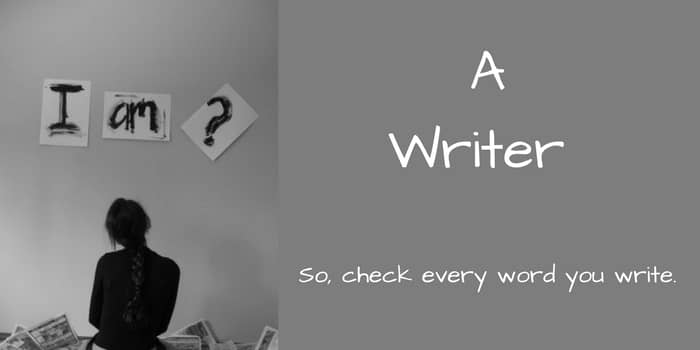A good writer checks every word they write
It never ceases to amaze me how little effort some writers put into their promotional writing for their own books. After slaving away for months or even years writing a book, surely the book deserves a little extra time and effort to promote it in the best possible light.
Some book descriptions, author bios, social media bios and other promotional texts I have seen look like mere afterthoughts and in some cases, not even properly proofread.
I was prompted to write this post after seeing the word ‘writing’ incorrectly spelt in not one but three author bios just this week. No, I’m sorry, but the word writing does not have two Ts!
A quick scan of some books on Amazon, plus other book listing sites, revealed many book descriptions that hardly made it to 100 words, and even then, had grammar or spelling errors.
Brevity is good sometimes, but not when you are trying to hook potential readers. So instead of highlighting all of the poor writing I have seen, perhaps it would be better to give a few suggestions on great promotional writing.
Author of (insert title).
I must have seen this used in author bios a thousand times. Even on Twitter, it allows 160 characters to be a little more imaginative and personal. ‘Sam authors his books from a human perspective’. A slight improvement, but in the third person? Cold and static to say the least. In any bio, no matter even if just 25 words, try to say why you are interesting and why it is worth finding out more about you. Be imaginative and avoid the tired old clichés.
Book descriptions need to be written so they can be used for various applications. A great tagline for attracting attention followed by a solid 300-400 word summary of the story. An extra 200 words then to include some background information about yourself. When written in this form, the tagline can be used standalone in social media posts and the longer versions for use on ebook retailers, book listing sites, interviews or blogs.
Whatever the need, you have something ready to go. Think about what makes your book great and then put that into your description. Remember that almost every prospective book buyer will read this before deciding to buy your book.
Probably the most difficult thing for writers to write is their own bio. However, it is probably the single most useful promotional tool. With writing and selling books so completely intertwined with the Internet, social media, websites and blogs, a writer’s profile can appear in literally hundreds of locations so it really needs to be informative, intelligent and well-written.
Lastly, never post any text that has not been carefully proofread. Even on the fast-paced Twitter feed, take care, as the grammar police are always watching you.





Couldn’t agree more! I’m just venturing into the publishing world and have read hundreds, if not thousands, of book descriptions and author bios. The difference between the well-written and poorly written is stark — and I view it as a harbinger of the quality of writing in the books they are promoting.
I know what you mean Beth. I refuse to read anything written by a writter! I’ll stick with those who are simply writers.
I guess this is another example of things working screwy for me. My titles with longer descriptions don’t sell as well as those I put just a sentence or two of description up for!
But I swear that nowhere in my bio does it state that I’m a writter. ;)
But Scath, those one or two sentences must be extremely well written!
Scath — wanna come write MY 1-2 sentence descriptions? Most of mine end up looking like War and Peace… :)
Derek, I can’t claim full credit.
Beth, I would, but I usually scream for help from a few writing buddies!
I have also seen some of these thoughtless errors, and it makes me wonder what image these writers are trying to portray. Even blogs posts where there are stupid errors, such as they’re instead of their or there. Or my personal favorite were instead of where.
I know people are in a hurry, but surely they could read over it just once, for the sake of their self-respect. I am a bit of a perfectionist, and I am painfully aware that my persona is a public one. If I cannot show that I take care even with small things, like twitter posts and bios, how can I expect people to spend money on a full-length novel?
My twitter bio is brief, but it includes a link to my blog, where a more personal bio is on display, and where all the links to my books can be found. So far, I have had no shortage of other writers following me. (lol)
Beth, if you are having trouble with the short synopsis, I found a wonderful blog post from Mike Wells in which he teaches you how to identify the basic elements of your book then write a two-sentence synopsis, or hook. For me it was a lifesaver. Derek, with your permission I include the link to get there http://ht.ly/6VBpJ .
And yes, this comment is excessively long, but I’m procrastinating today, so please forgive me.
Wow, wow, wow! Thanks, Niki!
Thanks, Niki. A great tip.
Writting. Love it! I think there might be a few things at play here. You’ve probably got a decent number of people who are writers — in that they’ve written, perhaps even self-published, things — just not good ones. Then you have writers who may be great at the craft, but awkward and/or dismissive when it comes to the self-promo stuff. They feel the art is important, and the promotion isn’t actually part of the art, so they spend less time/energy on it. Either way, it is off-putting to see bad grammar and/or spelling in something that’s supposed to give you faith in the person as a writer and make you want to commit time (and possibly money) to their work.
If the author doesn’t care about their own writing, why should I?
I hate grammatical errors and spelling mistakes. That said, I discovered, after my book was published, that two “professional” proofreaders missed several spelling errors–about six in a 242-page novel. It drives me crazy. When I proofread, I am a stickler for such things, but I cannot proof my own material. How do we find proofreaders who are reliable?
I don’t mean to sound snarky, but it seems to me that everyone thinks he or she is a writer. I’m working with someone on his memoir right now, and he doesn’t even know simple grammar rules. He has great stories to tell; he’s an incredible musician, and he’s rubbed elbows with some of the greats in music. However, he cannot really write. I don’t want to re-write the entire book, but it’s so difficult not to do that. Some people simply need to go back and take some simple writing classes and re-visit grammar and syntax.